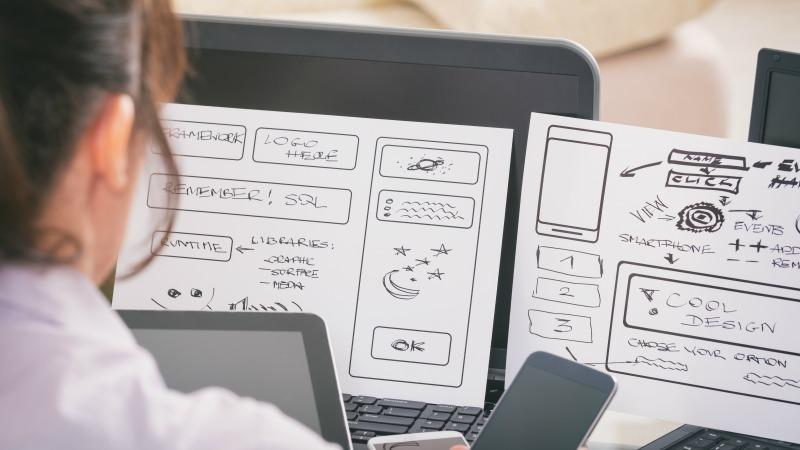What Color Is Your Brain Interview Questions
Common interview questions for developers
By Aoife Geary & Hannah Williams ,
The interviewing process often varies for developer roles. Although you are unlikely to find a set template to follow there are some common questions to prepare for, depending on your level of experience in the field.
A lot of variables can influence your success, from making a good first impression, to building camaraderie with your interviewers.
The interview process will likely involve a technical task and one or two interviews, typically one with HR, and one with a member of the product team.
While the more technical interview will focus on your favoured software, and things like how you ensure the product remains functional while fixing bugs and your programming habits, the HR interview will be looking at how you work with others and how you would fit with the company culture.
To help you put your best foot forward, we've compiled a list of the most common developer interview questions and how to answer them.
Get a development job in Ryanair, Hootsuite, Revolut and more

Getty/ vgajic
What development methodology are you most familiar with?
The interviewer is eager to know how you would fit into their organisation and its environment, so one of the ways to do that is by asking what methodology you're familiar with.
Depending on your previous work experience and background, you could give an example of a relevant situation where you had to use a specific methodology and how the process worked out.

Getty/ Weedezign
Tell us about a tough software development problem you encountered & how you solved it
This question is to help the interviewer identify the candidate's problem solving skills. It will give you the opportunity to showcase how you handle such challenges, showing the interviewer that you are capable of doing so when working with them.
It is a good idea to give the most recent and relevant example, so that the interviewer can analyse your most up-to-date skills.

What is your process to test and find bugs in an application?
This question is important to showcase your own process for finding security bugs, as every candidate will have a different way of doing so.
You can also use answering this question as an opportunity to show your knowledge of different debugging tools you are familiar with, whilst highlighting your preferred method ones.

iStock
What excites you most about coding?
A seemingly straightforward question but one that helps determine how passionate you are about your job.
HR managers want to hire a candidate who can articulate their excitement and passion for development, so don't be afraid to get animated when discussing the elements of your job you enjoy.

iStock
Tell us about a project you worked on that you're proud of
To answer this question you need to choose a project that's current enough to still be relevant but big enough to make an impact. The reality is that coding changes so quickly, it's pointless talking about an outdated build.
As well as describing the project, be sure to focus on your own role, where you added value and where you helped other team members.
The overall success of the project will be less significant to a hiring manager than your specific role in it.
The interviewer wants to see how you work and how you define success while being part of a team.

iStock
Describe a project that you worked on that you're not so proud of
This question not only shows a potential employer that you are capable of critically analysing the work of your team but also that you're not afraid to admit your own shortcomings or mistakes.
It's a good indicator of your ability to take feedback and learn from it and it's an extremely attractive quality in a prospective employee.

iStock
What source control do you use?
Source control is vital when working in a team to manage code in the build stage and track and save changes. It means that when multiple people are working on code and something breaks it's possible to revert to a stable version.
This question is to try to identify any bad habits in your coding and your experience of working within a team.

iStock
What's your favourite feature of the product?
If the place your interviewing at builds a certain product, being able to speak about the different features of the product shows your interviewer that you're invested in the company and that you've done your homework.
The strongest candidates will be able to offer insights on the different features of the product and an understanding of the different stakeholders involved in getting these features built.

iStock
How do you ensure you're communicating effectively with non-technical colleagues?
This question gives interviewers a really good insight into whether you have worked with non-technical teams in a productive and collaborative way or whether you've just added it to your application to look more rounded.
Watch the language and terminology you use to describe your non-technical team mates and be sure to talk about specific projects or workflows that illustrate your ability to communicate properly.

iStock
What passion projects are you working on?
Hiring managers are looking for developers who are committed to upskilling and can take responsibility for their own learning.
Talking about side projects shows an enthusiasm for programming outside your professional experience - it's also likely to be the subject that incites the most enthusiasm and interest in you, which are attractive qualities in a potential hire.
You don't need to pretend that your sole focus is work, it's important to show balance and a passion for projects beyond a pay cheque.

iStock
Why do you want to work at this company?
A simple but revealing question. If you want to stand out from other candidates reference specific features of the product and how you feel your skills are aligned with the requirements of the role.
Don't discount the non-technical aspects of the role either. Talk about why you feel you're compatible with the culture, why the company mission stood out to you and how you see yourself working within the team. Show the interviewers that you don't just want any job, you want this job.

iStock
Describe your ideal development environment
What conditions do you need to work at your best? Be honest here.
If you require a quiet room to code freely, you're probably not going to be a fit in the open plan office. Consider what working environment is most suited to your workflow.
Are you a fan of pair programming or do you find this a challenge? How do you work in a cross-functional team? What tools do you use to test code? Are you comfortable with peer code review? Do you communicate best with colleagues in person or by using messaging apps or Google hangouts?

iStock
Any questions for us?
This is usually the closing question of an interview and arguably the most important.
You want to leave a lasting impression on the interview panel while also ensuring you find out details of the role beyond the job description.
Show your interest in the team by asking about the workflow between each function, the management structure, the progression opportunities, the social elements and the culture.
Ask about upcoming projects and how the successful candidate will play a role in them.
Copyright © 2020 IDG Communications, Inc.
What Color Is Your Brain Interview Questions
Source: https://www.computerworld.com/article/3546972/common-interview-questions-for-developers.html